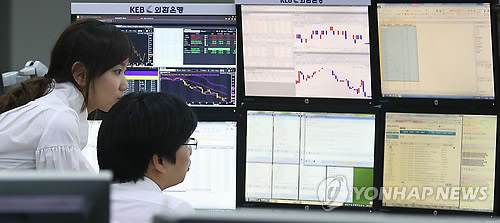South Korea's bourse struggled ahead of this year's long Chuseok holiday as tensions between the United States and North Korea reached new heights causing jitters among investors, observers here said Saturday.
According to the Korea Exchange (KRX), the country's KOSPI lost ground for seven straight sessions from Sept. 19 through Wednesday of this week. This is the longest losing streak for the main bourse since Sept. 25-Oct. 6 of 2014, it said.
"The loss of momentum caused the KOSPI, which was poised to recapture the 2,420 point level, fell to around 2,370 points," a local investor said. He said that one consolation was that stock prices recovered some ground Friday to end the week at 2,394.47, a gain of 21.33 points from the previous session.

(Yonhap)
Despite the rebound, data by the bourse operator showed transactions in shares had dropped sharply as the war of words between U.S. President Donald Trump and North Korean leader Kim Jong-un escalated. North Korea fired off a missile over Japan and tested its strongest nuclear device on Sept. 3, causing Washington and the United Nations to agree to more sanctions.
Trading that reached around 340 million shares Monday fell to 200 million Wednesday and dipped further to 180 million shares changing hands Friday.
The KRX said that the last time trading fell below the 200 million mark was in May 2014.
In particular, it said Friday figures were alarming since the total was equivalent to 52 percent of the daily average stocks traded in 2017. On average, 350 million shares changed hands every day this year.
"The very long holiday, coupled with instability in the global financial market and the North Korean risk, all caused investors to take a wait-and-see stance," said Lee Kyung-min, an analyst at Daeshin Securities.
The 10-day break in the bourse is the longest since the KOSPI was launched in 1983. The holiday encompasses two weekends, the three-day Chuseok, or autumn harvest celebration, and two national holidays.
Many market watchers said that the stock market tends to lose steam ahead of long holidays because investors cannot guess what developments may occur, but this year the loss was more pronounced because there have been rumors that Pyongyang may carry out new provocations ahead of the founding of its ruling Workers' Party of Korea on Oct. 10, or near Oct. 18 when China convenes its Communist Party Congress.
In addition, some analysts claimed that investors are taking a breather ahead of third quarter earnings results that start coming out after the holidays.
"Investors naturally shied away from making commitments ahead of the holiday," said Kim Yong-koo of Hana Financial Investment said. The researcher said investors will likely regain their confidence only after positive corporate earnings results come out for the quarter. (Yonhap)





![[From the Scene] Monks, Buddhists hail return of remains of Buddhas](http://res.heraldm.com/phpwas/restmb_idxmake.php?idx=645&simg=/content/image/2024/04/19/20240419050617_0.jpg&u=20240419175937)
